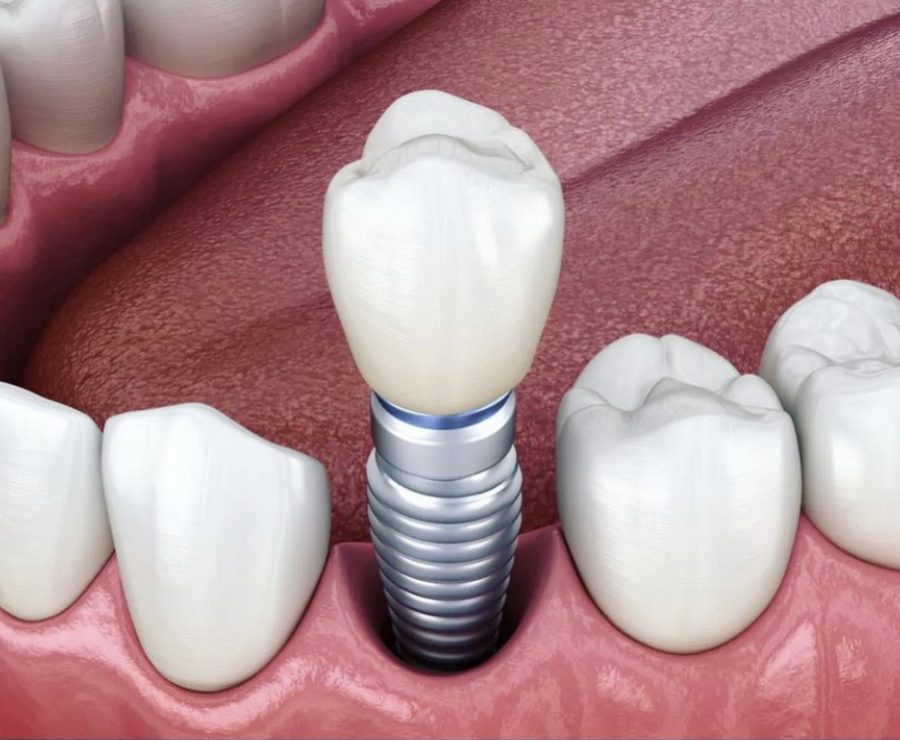Dental Implant

Dental Implant
is an artificial tooth root, or titanium fitting, that is surgically secured to the jawbone. The light and durable metal implant acts as an anchor for a crown, bridge or denture.
The Dental implant, which is made from titanium alloy, is fabricated in such a way that it mimics a tooth root. This light and durable implant fixture will then act as a stable foundation to hold prostheses such as crowns, bridges or dentures.
Since the implant fixture fuses to the bone, the patient will feel as if he/she grew a new tooth. Given that the artificial tooth that will be attached matches the natural teeth, it will look and feel authentic.
As with other prosthesis and restoration, this can last a lifetime depending on how you take care of them. Dental implant is a form of restoration and prosthesis; Therefore, several factors like trauma, gum disease and poor oral hygiene will also affect and damage your implant supported teeth as it will damage other forms of restoration.
Benefits of
Dental Implant
Naturally replaces missing teeth
Supports a single or full bridge
Eliminates the need for a partial removable denture
Helps prevent bone loss and gum recession
Makes it easier to chew, eat, talk and smile!
Fuses to living bone for that real tooth feel
Makes dentures more comfortable and secure
Eliminates messy denture glues and pastes
Eliminates wrinkles on your face giving you a younger appearance
Requires no adhesives, removals, soaking or cleaning
Provides a reliable, long-term dental solution that can last a lifetime!
Procedure of
Dental Implant
The dental implant process typically involves 3-4 trips to the dentist over a 3 to 6 month period. The surgical procedure is usually carried out under local anesthesia. In most cases, you can resume normal activities the day following the placement of your implant fixtures.
- Assessment
Before any implants are placed, it is important for your dentist to assess the health of your teeth and gums. If there are any signs of gum disease or decay, these must be treated first. Following this, your treatment will be designed after taking a cast,radiographs and a CT scan to evaluate the bone quality and check for nearby anatomical structures to avoid before any drilling. - Implant
After measuring where the implant is to be placed,the gum is cut and opened to expose bone. A series of drills will be used to widen the site making a socket in preparation for the seating of the implant fixture. The titanium implant is then fitted into this socket and the gums will be stitched back to cover the bone and implant. If there is insufficient bone material to accommodate the implant, a bone graft may be required. - Healing
Once the implant has been placed it is left to heal and integrate with the jawbone for between 6 weeks to 6 months. The bone tissue will grow and anchor itself into the microscopic rough surface of the implant. During this “healing period” patients are given temporary teeth (bridges) or continue to wear dentures. It is important that any temporary teeth do not exert any forces on the healing implant. After the healing period the gum is lifted again and a post is attached to the implant with a temporary crown. A week later when the surrounding gum tissue has matured, the final permanent restoration can be fitted to the implant. - Follow-up Treatment
Along with normal brushing and flossing, a periodic check-up with your dentist is required. They will check the individual implants and clean around the posts every 4 months. Dental implants do not suffer from normal teeth problems such as decay and hot/cold sensitivity.

What You Need To Know
About Dental Implants
Risk of implant failure include:
- Heavy Smoking
Heavy smoking slows down and hinders the healing process. - Excessive Alcohol Intake
Excessive drinking of alcohol disrupts healing of the gums. - Periodontal Gum Disease
All active gum disease must be treated prior to any implant procedure to ensure long term success of any treatment. Periodontal disease is a major cause of bone loss, which would hinder the success of any implant procedure. - Immuno-Compromised Individuals
This includes steroids, auto-immune disease and patients undergoing radiation treatment. - Teeth Grinders (Bruxism)
A night time splint can be given to treat this.
- GENERAL DENTISTRY
- COSMETIC DENTISTRY
- ORTHODONTICS
- ORAL SURGERY
- PEDIATRIC DENTISTRY
- PROSTHODONTICS
- ENDODONTICS
- PERIODONTICS
- DIGITAL X-RAYS




